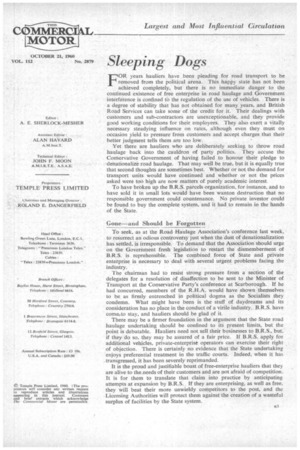Sleeping Dogs
Page 37

If you've noticed an error in this article please click here to report it so we can fix it.
FOR years hauliers have been pleading for road transport to be removed from the political arena. This happy state has not been achieved completely, but there is no immediate danger to the continued existence of free enterprise in road haulage and Government interference is confined to the regulation of the use of vehicles. There is a degree of stability that has not obtained for many years, and British Road Services can take some of the credit for it. Their dealings with customers and sub-contractors are unexceptionable, and they provide good working conditions for their employees. They also exert a vitally necessary steadying influence on rates, although even they must on occasion yield to pressure from customers and accept charges that their better judgment tells them are too low.
Yet there are hauliers who are deliberately seeking to throw road haulage back into the cauldron of party politics. They accuse the Corrservative Government of having failed to honour their pledge to denationalize road haulage. That may well be true, but it is equally true that second thoughts are sometimes best. Whether or not the demand for transport units would have continued and whether or not the prices asked were too high are now matters of purely academic interest.
To have broken up the B.R.S. parcels organization, for instance, and to have sold it in small lots would have been wanton destruction that no responsible government could countenance. No private investor could be found to buy the complete system, and it had to remain in the hands of the State.
Gone—and Should be Forgotten
To seek, as at the Road Haulage Association's conference last week, to resurrect an odious controversy just when the dust of denationalization has settled, is irresponsible. To demand that the Association should urge on the Government fresh legislation to restart the dismemberment of B.R.S. is reprehensible. The combined force of State and private enterprise is necessary to deal with several urgent problems facing the industry.
The chairman had to resist strong pressure from a section of the delegates for a resolution of disaffection to be sent to the Minister of Transport at the Conservative Party's conference at Scarborough. If he had concurred, members of the R.H.A. would have shown themselves to be as firmly entrenched in political dogma as the Socialists they condemn. What might have been is the stuff of daydreams and its consideration has no place in the conduct of a virile industry. B.R.S. have come to stay, and hauliers should be glad of it.
There may be a firmer foundation in the argument that the State road haulage undertaking should be confined to its present limits, but the point is debatable. Hauliers need not sell their businesses to B.R.S., but, if they do so, they may be assured of a fair price. If B.R.S. apply for additional vehicles, private-enterprise operators can exercise their right of objection. There is certainly no evidence that the State undertaking enjoys preferential treatment in the traffic courts. Indeed, when it has transgressed, it has been severely reprimanded.
It is the proud and justifiable boast of free-enterprise hauliers that they are alive to themeeds of their customers and are not afraid of competition. It is for them to translate that claim into practice by anticipating attempts at expansion by B.R.S., If they are enterprising, as well as free, they will beat their more unwieldy competitors to the post, and the • Licensing Authorities will protect them against the creation of a wasteful surplus of facilities by the State system.




















































































































